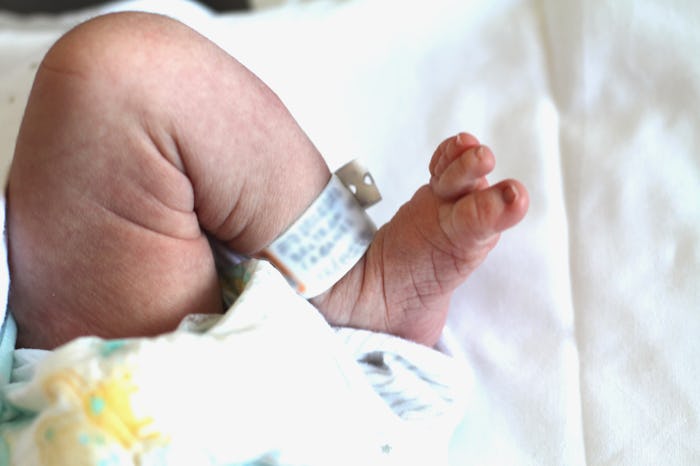News

Small New Study Suggests COVID-19 May Not Be Transmitted To Newborns During Pregnancy
Families bringing babies into the world in the midst of the new coronavirus, COVID-19, outbreak are understandably concerned about the risk to newborns. However, while research is still very limited, a small study published on Monday in the journal Frontiers in Pediatrics suggests that COVID-19 may not be transmitted to newborns during pregnancy.
Researchers in China from Huazhong University of Science and Technology followed four pregnant women who tested positive for COVID-19 in Wuhan, China, where the outbreak originated, and went on to deliver full-term infants. Three of the parents included in the study consented for their infants to be tested for the disease and none of the results came back positive. Additionally, none of the four babies developed fever, cough, diarrhea or any other serious symptoms, and all were alive and well when discharged from the hospital. According to the study authors, "All of the four babies are doing well and have been formula feeding since birth."
A similarly small study of nine women diagnosed with COVID-19 late in their pregnancies, also located in Wuhan, that was published in The Lancet in February also found no evidence of the virus in samples of amniotic fluid, umbilical cord blood and breast milk from six moms, and throat swabs from six babies. "Findings from this small group of cases suggest that there is currently no evidence for intrauterine infection caused by vertical transmission in women who develop COVID-19 pneumonia in late pregnancy," researchers behind The Lancet study wrote.
Wei Zhang, associate professor of preventive medicine at Northwestern University Feinberg School of Medicine and co-author of The Lancet study said in an article for the Northwestern Newsroom that the findings appear to "confirm there’s no scientific evidence for vertical transmission." However, the research is limited and researchers "don’t yet know about any potential transmission during earlier trimesters."
Additionally, these studies should not suggest that newborn babies are immune to COVID-19. In fact, a newborn delivered at North Middlesex hospital in London tested positive for COVID-19 this past weekend along with her mother, according to The Guardian. The newborn's mother was admitted to the hospital just days prior to giving birth, according to The Sun, after exhibiting symptoms of pneumonia and went on to test positive for COVID-19; it remains unclear when the baby contracted the disease. "We can't say it happened while the baby was still in the womb," Dr. William Schaffner, a professor of Preventive Medicine and Infectious Diseases at the Vanderbilt University School of Medicine, told Live Science, adding that it's possible the baby came in contact with the virus during or after delivery.
As COVID-19 is a new virus and research is developing, it is worth noting that the Centers for Disease Control and Prevention (CDC) have yet to release a definitive statement about how and if pregnant women can pass the virus to their babies during pregnancy, delivery, or breastfeeding.
Additionally, it is unclear if the disease poses any risk to fetuses and health officials have released no specific advisories for pregnant women and babies. However, the American College of Obstetricians and Gynecologists (ACOG) has said that pregnant women should be aware that they are considered an at-risk population for COVID-19 due to their vulnerability to other respiratory illnesses. According to the CDC, COVID-19 is a respiratory disease that causes symptoms such as fever, cough, and shortness of breath.
Indeed, as Christopher Zahn, MD, the ACOG's vice president of Practice Activities, previously told Romper, "as with other viruses, we believe pregnant women may be at higher risk of severe illness, morbidity, or mortality compared with the general population."
"However, currently very little is known about COVID-19, particularly related to its effect on pregnant women and infants, and there currently are no recommendations specific to pregnant women regarding the evaluation or management of COVID-19," Zahn added.
New research, of course, is key to determining whether there are any increased risks or adverse effects. So as health officials learn more, it's important to mitigate your risk as much as possible. Pregnant women should aim to follow the CDC's coronavirus prevention recommendations, such as washing your hands regularly and avoiding close contact with people who are sick.
If you think you’re showing symptoms of coronavirus, which include fever, shortness of breath, and cough, call your doctor before going to get tested. If you’re anxious about the virus’s spread in your community, visit the CDC for up-to-date information and resources, or seek out mental health support. You can find all of Romper’s parents + coronavirus coverage here, and Bustle’s constantly updated, general “what to know about coronavirus” here.
Studies referenced:
Chen Y, Peng H, Wang L, Zhao Y, Zeng L, Gao H and Liu Y (2020) Infants Born to Mothers With a New Coronavirus (COVID-19). Frontiers In Pediatrics, https://www.frontiersin.org/articles/10.3389/fped.2020.00104/full
Chen, H., Guo, J., Wang, C., Luo, F., Yu, X., Zhang, W., … Zhang, Y. (2020). Clinical characteristics and intrauterine vertical transmission potential of COVID-19 infection in nine pregnant women: a retrospective review of medical records. The Lancet, https://www.thelancet.com/journals/lancet/article/PIIS0140-6736(20)30360-3/fulltext
This article was originally published on